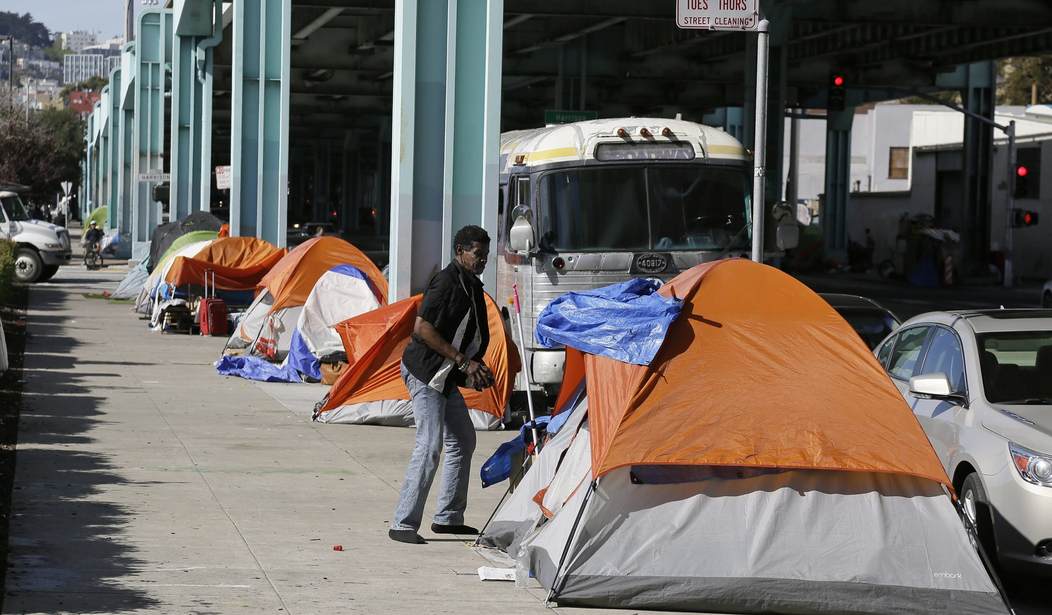America’s most beautiful city is being torn apart by its own, ahem, internal contradictions:
San Francisco, America’s boom town, is flooded with the cash of well-paid technology workers and record numbers of tourists. At the same time, the city has seen a sharp jump in property crime, up more than 60 percent since 2010, though the actual increase may be higher because many of the crimes go unreported.
Recent data from the F.B.I. show that San Francisco has the highest per-capita property crime rate of the nation’s top 50 cities. About half the cases here are thefts from vehicles, smash-and-grabs that scatter glittering broken glass onto the sidewalks.
The city, known for a political tradition of empathy for the downtrodden, is now divided over whether to respond with more muscular law enforcement or stick to its forgiving attitudes.
Hold it right there, New York Times; the city by the Bay is not known for its empathy for anything except its own beauty and a laissez-faire tradition of indulging crazies as long as they amuse the populace. Not for the first time, San Francisco (where I lived and worked for nearly four years back in the days of the Zodiac Killer, George Moscone, Harvey Milk and the Peoples Temple) is being riven by its high desirability quotient and the results of “tolerance” that leaves armies of homeless and psychos on the once-pristine streets.
The Chamber of Commerce and the tourist board are calling for harsher measures to improve what is euphemistically called the “condition of the streets,” a term that encompasses the intractable homeless problem, public intravenous drug use, the large population of mentally ill people on the streets and aggressive panhandling. The chamber recently released the results of an opinion poll that showed that homelessness and “street behavior” were the primary concerns of residents here.
“We are the wealthiest big city in the wealthiest state in the wealthiest country in the world, and we have this situation on our streets,” said Joe D’Alessandro, the chief executive of San Francisco Travel, a tourism organization. “People believe that everyone has the right to be on the streets. However, I think there is a tolerance limit to bad behavior.”
Right. The City (as it terms itself) is small, only 47 square miles, and its proximity to Silicon Valley has driven its already high real-estate prices beyond the means of any normal person. At the same time, California has always been the place where the flotsam and jetsam of the American experiment wash up, and the city’s inability to control the latter creates exactly the situation it finds itself in today.
Naturally, some blame… wait for it… the wealthy:
On the other side is David Campos, a supervisor who opposes the increase in police officers and describes Mr. Wiener’s views as “a very knee-jerk kind of punitive approach that is ineffective and inconsistent with the values of San Francisco.” Mr. Campos and many others evoke the charitable spirit of the city’s namesake, St. Francis.
“We are not going to criminalize people for being poor,” he said. “That criminalization is only going to make it harder for them to get out of poverty.” San Francisco’s liberal ethos, Mr. Campos said, was changing as the city focused more on business and the needs of the tech industry.
“I think there has been a shift in the people who have come to San Francisco,” Mr. Campos said of the city’s new arrivals, a group that is well educated and well heeled. He deplores what he describes as a growing “sink-or-swim” free-market ideology that stands in contrast to the city’s traditions. “I don’t know which San Francisco will prevail,” he said.
Recall that San Francisco came into being thanks to the Gold Rush and the transcontinental railroad — the city’s real traditions, along with high culture and spectacular residential architecture and fine dining — then place your bets. Only a liberal couldn’t figure this out. And only a progressive could feel bad about it.









Join the conversation as a VIP Member